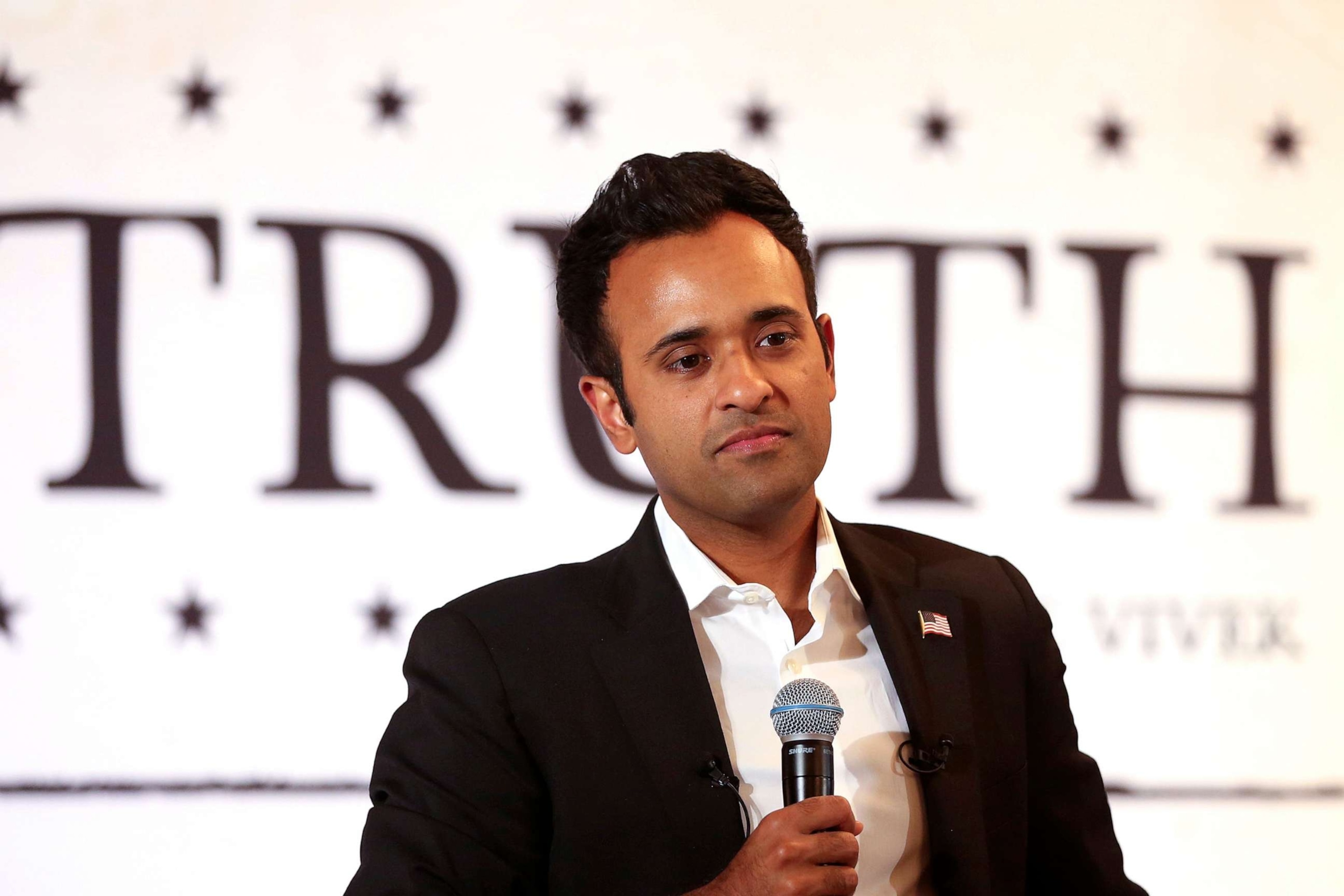Pressed on Trump's conduct, Ramaswamy argues: 'Bad judgment' is not 'a crime'
The GOP candidate believes a Trump pardon is what's best for the country.
Republican presidential candidate Vivek Ramaswamy, one of Donald Trump's rivals in the 2024 race and one of the former president's biggest defenders on the trail, said Sunday that while he would have made different judgments than Trump regarding Jan. 6 and the handling of classified documents -- those decisions shouldn't be grounds for prosecution.
"I do draw a distinction, George, between bad behavior and illegal behavior," Ramaswamy said in an interview with ABC "This Week" anchor George Stephanopoulos. "And once we start conflating those two things, I think we're in a long, downward slide as a country."
Ramaswamy was repeatedly pressed by Stephanopoulos about disagreeing with some of Trump's conduct -- and which actions in particular he disagreed with -- while still backing the former president.
Ramaswamy, an entrepreneur and commentator, has been thrust into the spotlight since entering the race for the White House early this year. He has defined his platform by promising to embrace and expand Trump's policies.
He has also committed to pardoning Trump if he is elected president and quickly raised his hand during the first GOP primary debate when asked if he would vote for Trump if Trump is convicted.
"Can you just explain why you would vote for a convicted felon for president?" Stephanopoulos asked on Sunday.
"I expect to be the next nominee, and that's why I'm running for president. But I also intend to keep the [loyalty] pledge that I made," Ramaswamy responded.
When Stephanopoulos followed up, Ramaswamy sought to dismiss the indictments against Trump as "outright, downright politicized persecutions," which prosecutors reject.
Trump is charged in four cases and has pleaded not guilty in each.
"I'm in this race because I believe I can lead us forward and reunite this country. But if it's not me as the nominee, I still expect that Donald Trump or whoever the Republican nominee will be better than the alternative," Ramaswamy said.
Stephanopoulos asked about when Ramaswamy in 2021 described Trump's actions around Jan. 6 as "abhorrent" and what particular decisions he was criticizing.
Ramaswamy initially pivoted his answer, maintaining that "systematic censorship was the true cause of what happened that day" and citing other issues including COVID-19 restrictions and Hunter Biden's scandals.
When Stephanopoulos drilled down, Ramaswamy said he wouldn't have urged supporters to march to the U.S. Capitol, as Trump did two years ago -- though Ramaswamy also noted Trump at one point called for peaceful demonstrations -- and he wouldn't have endorsed competing but unauthorized slates of electors before Congress, an alleged criminal scheme detailed in two of Trump's indictments.
"I disagree with a lot of what he did that day. I said so at the time," Ramaswamy said, adding, "But that is still different for saying that he should be prosecuted for it, which I think sets a dangerous precedent."

On Trump's other federal indictment, for allegedly mishandling and refusing to return government secrets while out of office, Ramaswamy again said that he would have acted differently but didn't believe anything illegal was done.
"I'll come back to a simple theme, and I hope I can make this clear for you: There's a difference between a bad judgment and a crime," he said.
"It would be easier for me if Donald Trump were eliminated from competition. That is why it's particularly important for me to state with clarity that on principle, I'm still against seeing him eliminated that way," Ramaswamy said. "And that's why I have been so vocal about this."
Stephanopoulos followed up to say: "You find his actions abhorrent around Jan. 6, you said he was wrong to take the classified information, you said you would not do that yourself. But you still say you would vote for him for president. That's what I don't get."
Ramaswamy responded that "I said what every Republican nominee said to make it on that debate stage, that we will actually support the Republican nominee from our party."
More broadly, he insisted that his focus is on the future and on delivering Republican priorities, including "go[ing] further than Trump in advancing that America first agenda."
Ramaswamy also argued that there was an "obsession," in culture and in the media, with "looking backwards" at one person -- at Trump -- "as opposed to talking about what we need to talk about." He called that a hindrance to moving the country forward to national unity.
Stephanopoulos pushed back: "Sir, that man is the front-runner for the Republican nomination right now. He's a former president of the United States. He's leading you by 40 points [in the polls]. Yet you still say you would vote for him despite what you say about his behavior. That's the question I am asking. It's not an obsession."
Ramaswamy said he planned to vote for Trump "just as I expect him to vote for me when I'm the nominee."
"If I'm expecting and deciding between the nominee, even though I disagree with many of my rivals in the Republican Party on a lot of issues, I think any of them will be better than Joe Biden or Kamala Harris to move this nation forward," he said.
He continued: "That is my arbitrator when I cast my vote for who the next president is -- who's going to serve the interests of the American people?"



